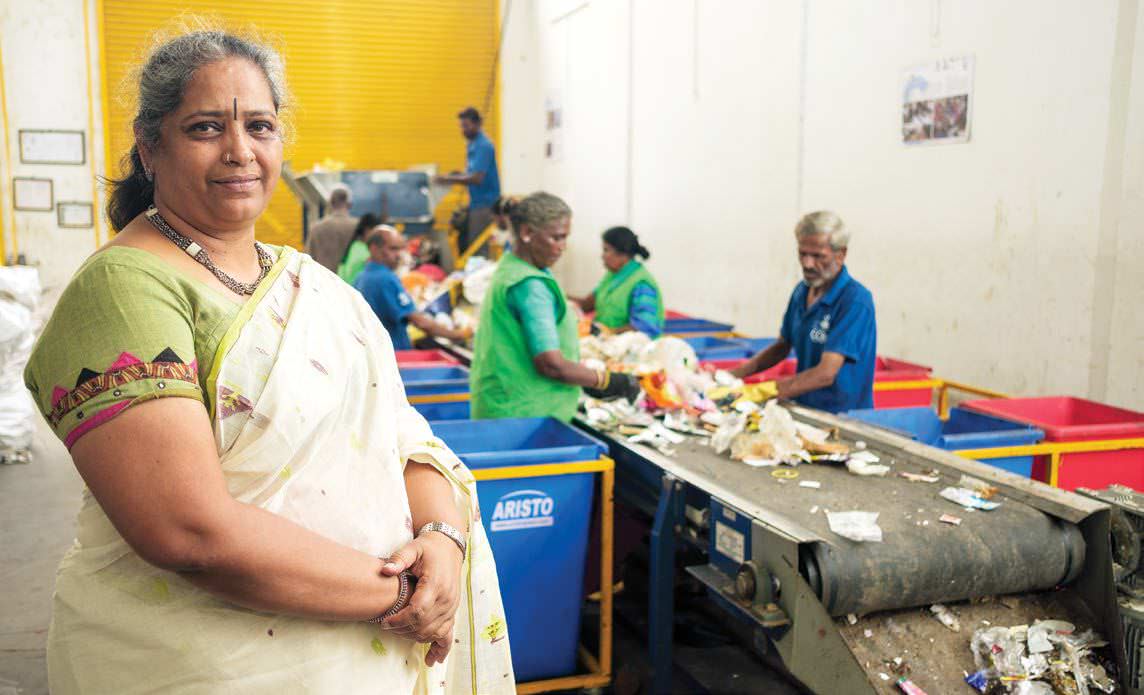Nalini Shekar and Shekar Prabhakar’s Hasiru Dala brings dignity to the lives of waste pickers besides being a green warrior in the fight against trash.

The work done by India’s sizeable army of men and women who dumpster dive, for tradeable plastics, metal, bottles, is invisible; the impact of their efforts, though, is conspicuous—a lot of garbage clearing in India is done informally, by waste pickers who work without any job security, fixed salary or recourse to a social safety net.
In 2012, Bengaluru-based couple Nalini Shekar and Shekar Prabhakar decided to do something for the unorganised waste pickers of their city, where rapid urbanisation is creating an unprecedented waste management crisis. The two founded an umbrella organisation for six NGOs that were already working with waste pickers: Hasiru Dala. The name (meaning Green Brigade in Kannada) was chosen by the waste pickers themselves, recalls Prabhakar, 54, in an interview in his office.
In November 2013, the two started an eponymous trust, which soon approached the Lok Adalat and, with its backing, got the Bruhat Bengaluru Mahanagara Palike (BBMP), the city’s civic body, to issue formal identification cards to waste pickers. For most of them, this was their first government recognised ID, carrying the municipal commissioner’s signature. “For the first time in the country, an urban local body issued ID cards [to waste pickers],” says Nalini, 53.
So far, around 8,000 such IDs have been issued thanks to Hasiru Dala. Further, urban local bodies across the country are expected to implement similar policies, says Prabhakar. On the basis of the IDs, women have been able to open bank accounts and Hasiru Dala has helped 400 youngsters get education loans from the central government, and 1,800 families were able to avail health insurance from central government schemes.
This story is from the June 8 2018 edition of Forbes India.
Start your 7-day Magzter GOLD free trial to access thousands of curated premium stories, and 9,000+ magazines and newspapers.
Already a subscriber ? Sign In
This story is from the June 8 2018 edition of Forbes India.
Start your 7-day Magzter GOLD free trial to access thousands of curated premium stories, and 9,000+ magazines and newspapers.
Already a subscriber? Sign In

Home-Cooked Meal Is Now Greatly Valued
The pandemic has also brought with it an improved focus on hygiene, use of technology in dining, rise of cloud kitchens and resurgence in popularity of Indian ingredients

Paytm 3.0 - Reaching Near Breakeven In Two Years
As of 2020, Vijay Shekhar Sharma’s super app for financial services had run up losses in thousands of crores. Now, as digital payments gets yet another boost courtesy Covid-19, he’s hopeful of reaching near breakeven in two years

THE PANDEMIC HAS CAUSED WOMEN GREATER LABOUR PAIN
Covid-19 has shown that women are more likely to face the brunt of job losses than men, and find fewer opportunities when they want to resume. That apart, several have to deal with increased hours of unpaid work at home and even domestic abuse

LEADERSHIP WILL BE ABOUT SEEING THE BIGGER PICTURE
Leaders must not only guard their teams first during a crisis, but also deal with stakeholders with respect and dignity. And apart from pursuing business goals, they should remain committed to our planet and the environment

PHILANTHROPY SHOULD BE HUMBLE, BUT NOT MODEST
Apart from building a flexible and resilient framework for the future, philanthropists, civil society and the government must work in tandem so that every rupee is absorbed on the ground

INTEGRATED HEALTH CARE, TECH WILL DISRUPT SECTOR
While clinical research will get a boost, having a skilled workforce and public spending on health care will be challenges in the near term

DIGITALISATION WILL HELP IN VALUE CREATION
As the pandemic brings technology and innovation to the core of business and daily life, the next decade will see about 150 million digital-first families in India

Industry 4.0: Climate Revolution?
Augmenting sustainability alongside digital capabilities is an economic, competitive and global opportunity for India’s businesses, but regulations need to reflect intent

EV Dream Still Miles Away
Electric vehicles have remained a buzzword in India for years. But not much has moved on ground due to high upfront costs, range anxiety and charging infrastructure

Living Waters
A virus has caused us to scramble for oxygen but our chokehold on the environment is slowly strangling the very waters that breathe life into us. The virus is a timely reminder: We are merely consumers, not producers of life’s breath on this planet